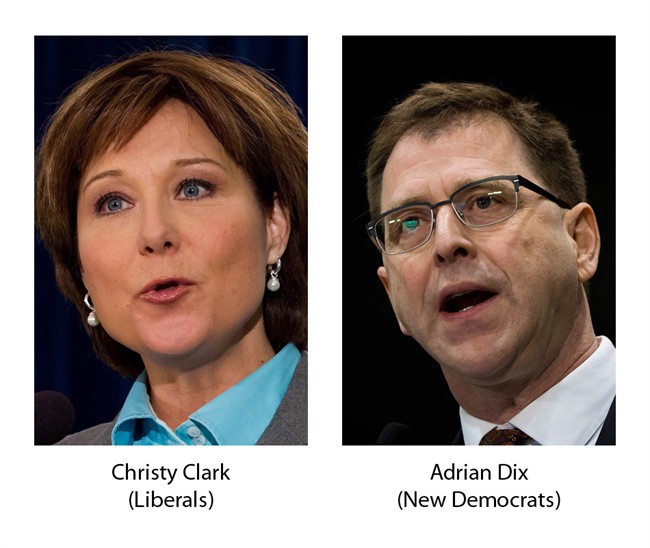VICTORIA – Premier Christy Clark has the most to gain and lose as the first of two election debates hit the airwaves Friday, say political experts.

They agree her previous career experience as a radio host gives her a presentation advantage over the three other political leaders, but she faces an audience primed to give her thumbs-down reviews on both delivery and substance.
New Democrat Leader Adrian Dix, who one pundit described as having a face for radio, enters Friday’s leaders radio debate at Vancouver’s CKNW studios with the advantage that he’s the perceived front-runner in the May 14 election, but he’s not a trained showman.
Conservative Leader John Cummins comes to the debate looking to convince right-leaning Liberals he’s worth a second look and Green Party Leader Jane Sterk wants the opportunity to steal votes from the NDP, but that task became a bit more difficult with Dix’s decision to oppose the expansion of the Kinder Morgan pipeline to Vancouver’s port.
The four leaders square off again on Monday during the campaign’s only all-party televised debate, scheduled to last 90 minutes.
“The stakes are really high for the Liberal Party going into this debate,” said University of Victoria political science Prof. James Lawson. “The question is whether those people who have moved, assuming the polls are right, if they can be moved back to the B.C. Liberals.”
Lawson said public opinion polls for the past year have consistently placed the NDP ahead of the Liberals and that anti-Liberal sentiment has shown few signs of changing.
Dix enters the debate with the double advantage of leading the polls and holding the public perception he is going up against an experienced broadcaster in Clark.

Get daily National news
“Mr. Dix may be insulated a bit if he comes across as not the best star of stage and screen, but as very focused on policy issues,” said Lawson. “For those kinds of voters, that may not be altogether a bad thing. They may want a policy wonk.”
Martyn Brown, an author and aide to former premier Gordon Campbell, said the debates are Clark’s last chance to change the direction of the campaign, which has been favouring Dix.
“She certainly has the edge and this is her best and last hope to make a fundamental shift in the campaign,” said Brown. “Christy Clark has one last opportunity to salvage her campaign as far as possible.”
But Clark will face voters who will view Dix as if he’s auditioning for premier, he said.
“People are going to be more concerned about content and his tone than anything,” Brown said. “It won’t take very much for him to exceed expectations on (radio) and television because people don’t think he’s the best performer, but they think he’s a serious and likely prospect for premier.”
Clark said she was confident heading into both debates, but what she really wanted was a Clark-Dix showdown to giver voters a true sense of what both leaders and their parties have to offer.
“I have always said I would prefer a one-on-one televised debate, and the reason for that is, four people on the radio — having been a radio host myself — it’s hard to follow sometimes,” said Clark. “It’s hard to know who’s speaking and who’s saying what, and I think it will be easy for Adrian Dix to get lost in the crowd.”
“I think British Columbians need to know who I am, who he is, and what our visions are for British Columbia, and really, the only effective way for people to see that is for them to see us in a televised, one-on-one debate, so I’m still hopeful he will accept the invitation to do that debate”, she said.
Dix warmed up his radio voice with appearances on talk shows at several Vancouver stations Thursday.
He told listeners that though a government led by him would oppose the Kinder Morgan pipeline expansion, it would not hold a referendum on the subject. He also said an NDP government would conduct a review of the BC Rail sale and the criminal charges that resulted.
“I think it’s important that a review take place because there are so many unanswered questions. But I do think — that’s why we’re going to put strict financial parameters around it — that this is not the only priority we’re facing.”
The NDP platform set aside $10 million over two years for a judicial inquiry into the BC Rail sale.
Dix said everything his government would do needs to be tested against the limited financial resources it would be inheriting from the Liberal government.
CKNW host Bill Good pressed Dix further on his plans to review several government operations, including BC Hydro, BC Ferries, Translink, the proposed Northern Gateway pipeline and Kinder Morgan’s plans to twin a pipeline.
“But after 12 years in opposition can’t you tell us what you’d do. So far all you’ve told us is review, review, review,” Good said.
Dix countered that there are huge cost pressures, and that means they’re not doing many things that people what them to do that would involve an increase in spending.
“The first eight days of the campaign every day I went out and laid a specific program for change. The Liberals were critical of it — that’s what their campaign is,” Dix said. “I think our plan is a good plan.”
Dix released his platform in its entirety Wednesday, outlining $2 billion in expenditures over three years to fund welfare, education and health-care reforms.







Comments